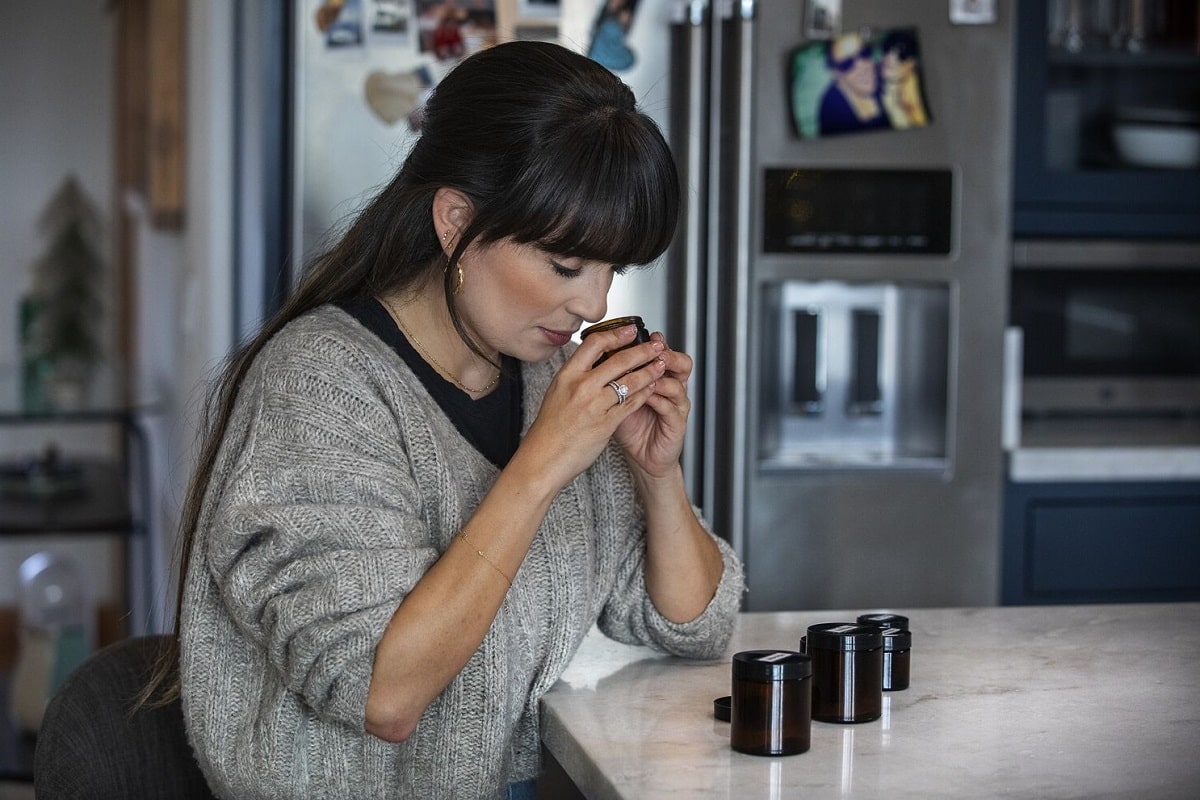COVID-19 can interfere with your senses, especially your taste and smell. However, even after recovery, these sensations do not usually return quickly and sometimes do so in an unexpected manner.
Without taste and fragrance, it is difficult to genuinely feel better. And if everything stinks, the situation is considerably worse.
Numerous pleasant memories are connected to our sense of smell. Social activities are frequently centered on eating, cooking, and baking. The sense of smell enhances our perception of taste, adds nuance to flavors, and encourages salivation. When you can’t participate in these activities – or even completely appreciate a delicious meal – as you once did, it’s typical to feel sad and depressed.
Fortunately, most people do not experience permanent alterations in taste and fragrance. Additionally, there are treatments that may aid with healing. Learn why some people have these symptoms and what you may do to regain your senses by reading on.
How the COVID-19 virus affects your senses of smell and taste
How COVID-19 alters your sense of smell and taste is unknown. The good news is that COVID-19 does not appear to harm your olfactory sensory neurons and taste receptors. For more information visit Tib Diagnostics Center.
Instead, it appears that the coronavirus affects the cells that surround the olfactory nerve. When these support cells are not functioning properly, they can prevent the olfactory nerve’s impulses from reaching the brain, resulting in a change or loss of scent.
Since approximately 80% of what we taste is derived from what we smell, loss of smell frequently results in loss of taste. Without a sense of smell, we are only able to taste the basic flavors of sweet, salty, sour, bitter, and savory.
COVID-19 can influence your sense of smell in several ways. There are three conditions you might encounter:
Anosmia is the total absence of scent.
Anosmia is the loss of all sense of smell and is frequently one of the initial symptoms of a COVID-19 infection. Studies estimate that up to 60% of persons infected with COVID-19 have anosmia. Anosmia can also be induced by nasal growths and infections such as the common cold or influenza.
Hyposmia – diminished ability to smell
You may be able to smell some things but not others if you have hyposmia, therefore it is possible that you have this condition without realizing it. Many persons with COVID-19 exhibit hyposmia, even though they believe their sense of smell is normal, according to studies. Also contributing to this condition include aging, medical issues, and disease.
If you have total loss of smell due to COVID-19, you may feel hyposmia during the healing phase, as the sense of smell often returns gradually. As it progresses, there may come a point when you can only smell or taste things with strong scents.
Parosmia is an abnormal perception of smell.
As you recover from COVID-19, it is also likely that things will smell differently — and not in a nice manner. If you find yourself wondering why everything smells so foul after contracting COVID-19, you may have parosmia.
If you have parosmia, objects that ordinarily have a pleasant odor (or no odor) will suddenly smell foul or putrid. The “COVID odor” caused by parosmia is typically a burnt chemical stench, but yours may differ. Some COVID-19 patients with parosmia describe the odor as rotting food, garbage, or ammonia. The “COVID odor” seems to be most offensive when coffee, onions, garlic, meat, citrus, toothpaste, and toiletries are nearby.
Approximately 7% of COVID-19 patients who experience loss of taste and smell develop parosmia, according to one study. In addition to being a symptom of respiratory illness, seizures, and brain tumors, parosmia can also be a sign of these conditions.
When does the sense of smell return after contracting COVID-19?
Loss of smell can be one of the most chronic COVID-19 symptoms. The majority of people recover within a few weeks, but for some, it might take much longer – even over a year.
In one study, around 25% of those who lost their sense of smell due to illness did not regain it within 60 days. The number of individuals who regained their sense of smell grew considerably after a few months. In a separate trial, 86 percent of patients restored their sense of smell within four months, and 96 percent by 12 months.
When does parosmia following COVID-19 begin?
Usually, an altered sense of smell develops two to three months after contracting COVID-19, when the patient believes he or she has healed substantially. It may appear that your sense of smell is gradually returning, but then all of a sudden, everything stinks. Or, you may go from being unable to smell anything to smelling just foul odors. The average duration of parosmia is three months, but it can continue for six months or longer.
Can COVID-19 permanently impair the senses of smell and taste?
It is doubtful, as COVID-19 does not appear to directly alter olfactory nerves or taste buds; rather, it affects the cells that support olfactory nerves.
Your body is exceptional at regenerating nerve support cells. Over time, the structures supporting your olfactory nerves should fully recover.
You may, however, need to retrain your brain to interpret signals it has been a while since you’ve encountered.
When does flavor return after COVID-19?
The good news is that once your sense of smell returns to normal, you will be able to taste things normally.
How do I regain my sense of smell and taste after contracting COVID-19?
Eventually, your senses of smell and taste will likely return on their own. However, if you’d like to expedite the process, there are steps you may take.
Eliminating sinusitis inflammation
If alterations to your sense of smell persist longer than your other COVID-19 symptoms, it may be due to nasal irritation. These home remedies can assist:
A neti pot for saline rinsing
In a pot resembling a genie’s lamp, you will blend a little amount of specific salt with warm distilled water for this treatment. When everything is combined, the solution is poured via the nasal cavities.
Rinsing your nasal cavities in this manner removes any mucus or debris that could be causing inflammation. You can find neti pots online or at local stores near seasonal allergy remedies.
Typically, neti pots include packets with the necessary salt combination. If neither is available, search for nose-cleansing salt or neti pots. You should also purchase distilled water from the store. Because they include microorganisms that may harm your nasal passages and, potentially, your brain, tap water, and filtered water should not be used in a neti pot.
Nasal sprays for inflammation reduction
An over-the-counter nasal steroid spray, such as Flonase or Nasacort, may also be used to treat sinusitis. These sprays become effective rapidly and are generally safe, especially if you just use them for a brief period of time. There are certain individuals who should not use nasal sprays. Prior to purchasing one, it is prudent to consult your physician to determine if it is a suitable treatment for you.
Retraining your olfactory sense
Additionally, it is possible that your brain has “lost” how to smell. As a result, you may be unable to detect anything or have an altered sense of smell. A forgetful brain may sound alarming, but keep in mind that the brain is always learning and relearns.
How then can you retrain your sense of smell after contracting COVID-19? Smell therapy can be beneficial; the method entails inhaling strong fragrances for at least 20 seconds while recalling memories and experiences associated with the scent. We typically recommend rose, lemon, clove, and eucalyptus essential oils due to their distinct aromas.
Keep in mind, however, that it may take three months or longer to observe the effects of fragrance therapy. It is necessary to persevere. For more information visit our website.
How can a doctor help me recover my sense of taste and smell after contracting COVID-19?
It may take considerable time before your senses of taste and smell begin to improve. However, having the assistance of a physician or clinician might make the process simpler.
Make an appointment with your primary care physician first. They will discuss your medical history, the duration of your taste and smell concerns, and your treatment objectives. In addition, they will conduct an examination or order any tests that will aid in diagnosing your condition and determining the optimal treatment.



